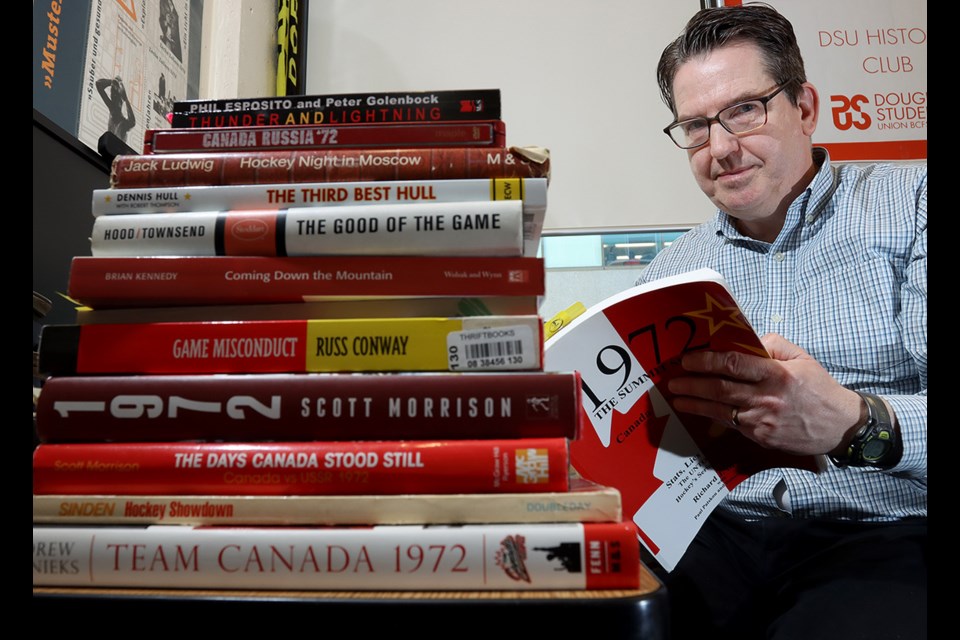A Coquitlam historian is shining a new light on one of the greatest villains in Canadian sports lore.
Cedric Bolz, who graduated from Centennial Secondary School and is now the head of the history department at Douglas College, has published an alternate view of the famous 1972 Canada–Russia hockey Summit Series as it was seen through the eyes of Josef Kompalla, one of its referees.
Kompalla and fellow West German Franz Baader were among eight officials that also included four Americans, a Swede and a Czech, who were assigned to work the historic eight-game showdown between hockey’s two greatest superpowers at the time.
But Canadians old enough to remember the grainy live TV pictures from Moscow’s Luzhniki Ice Palace beamed into their living rooms and even classrooms that September 51 years ago likely recall Kompalla as Public Enemy No. 1.
Even those who’ve only experienced the series second hand through subsequent memoirs and documentary films have come to vilify Kompalla, said Bolz.
Authors and filmmakers have perpetuated the narrative that the amateur referee was out of his depth arbitrating games between hockey’s greatest professional players and the mighty Soviets.
Or worse, they surmised, he was a complicit East German.
Until now.
Historical oversight
Bolz’s book, The September He Remembers, flips Kompalla’s story and his role in the Summit Series on its head.
It is, Bolz said, “the first step in correcting a major historical oversight and adding a new chapter in the Summit Series’ growing, mutable legacy.”
Bolz said he first heard of Kompalla through his stepfather, who’d played professional hockey in Germany for several years before moving his family to Canada.
The veteran referee officiated more than 2,000 games including several world championships.
He was revered in Europe and even earned a place in the International Ice Hockey Federation’s (IIHF) Hall of Fame.
But in Canadian hockey lore, Kompalla is a reviled figure who seemed determined to derail the NHLers from affirming their superiority on the ice over the Soviet Union.
J.P. Parise physically attacked him after he’d been assessed a penalty.
He bore the wrath of a frustrated Alan Eagleson who threatened to pull the Canadian players from Game 8 when Kompalla drew the refereeing assignment for the decisive match and then threw chairs on the ice after Parise was penalized.
He was chased down hallways by players and team officials incensed by some of the calls he’d made.
Even after the series was decided, Kompalla was harassed by Canadian players on a flight to Prague for an exhibition game against the Czech national team.
A quiet life of retirement
When Bolz heard Kompalla was still alive and living a quiet life of retirement in Krefeld, Germany, he reached out, determined to reconcile the conflicting images of a pivotal character in hockey’s greatest drama who seemed to have been left behind by its history.
“I’m a historian,” Bolz said. “My job is to document voices and this was a voice.”
Over the course of three years of phone interviews and personal visits, Bolz constructed a picture of a modest man who still loves hockey but can’t understand how he’d become one of the sport’s most notorious characters.
“It was always baffling to him,” Bolz said.
Road blocks
Along the way, Bolz ran into road block after road block in his efforts to gain an understanding of how Kompalla had become so despised.
Players still alive like Red Berenson and Wayne Cashman wouldn’t talk to him.
Even Ken Dryden, the Hall of Fame goaltender renowned for his thoughtful ruminations about the sport and the author of two memoirs about the series, wouldn’t return his calls.
“A narrative had been crafted,” Bolz said. “Legend continues to trump the way things actually were.”
Bolz believes Kompalla was collateral damage, a convenient foil, in a hockey drama that was supposed to be a friendly cultural exchange in the spirit of detente that had started to warm the Cold War in the early 1970s, but quickly devolved into an athletic expression of the great divide that still existed between East and West when the Canadian NHLers realized their opponents wouldn’t be the pushovers as some observers had billed them.
Time is running out
Kompalla is now 87 and Bolz is all too aware time is running out to set the record straight and reform the referee’s legacy.
He hopes his book, academically annotated and cross-referenced through multiple sources, will help facilitate that.
Some who’ve helped shape the story of the Super Series over the past 51 years have taken notice and made overtures to correct the historical record, like the popular misconception that Kompalla was from East Germany when in fact he’d fled communist rule in Poland and settled in Germany’s democratic West.
As for the aging referee who continues to travel the German countryside to attend hockey games as a spectator, Bolz said he still holds out hope his contribution to the series will be recognized in a more positive light.
“He’s always wondered why he’s never been invited to any of the series’ anniversaries,” Bolz said of Kompalla. “It’s important to see him get some sort of closure.”
• The September He Remembers is published by Jess Press, a division of The Journal of Emerging Sports Studies. An official book launch is being held April 13, from 4:30 to 6 p.m. in Room N2203 at the New Westminster campus of Douglas College.


